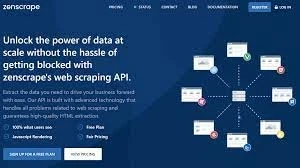In today\'s data-driven world, extracting information swiftly and efficiently is paramount for businesses aiming to stay competitive. APIs (Application Programming Interfaces) play a pivotal role in this process, enabling seamless data extraction from diverse sources with minimal manual intervention. This blog explores how APIs facilitate streamlined extracting data from API, their benefits, and practical applications across industries.
Understanding APIs and Data Extraction
APIs serve as intermediaries that allow different software applications to communicate and interact with each other. When it comes to data extraction, APIs provide structured methods for retrieving specific data points or datasets from various sources such as databases, websites, or cloud services. This structured approach ensures that developers can programmatically access and integrate data into their applications or analytics platforms.
Benefits of Using APIs for Data Extraction
1. Efficiency and Automation: APIs automate the data extraction process, eliminating the need for manual copying and pasting. This automation not only saves time but also reduces errors associated with manual data entry, ensuring data accuracy and consistency.
2. Real-Time Data Access: Many APIs provide real-time data access, allowing businesses to retrieve up-to-date information instantaneously. This capability is crucial for applications requiring current market trends, customer insights, or operational metrics.
3. Scalability and Flexibility: APIs are scalable, meaning they can handle large volumes of data requests without performance degradation. Moreover, APIs are flexible in terms of data formats and protocols supported, accommodating diverse integration requirements across different platforms and devices.
4. Enhanced Decision-Making: By facilitating access to timely and relevant data, APIs empower businesses to make informed decisions swiftly. Whether analyzing customer behavior, market trends, or operational performance, access to data via APIs enhances strategic planning and operational efficiency.
Practical Applications of API Data Extraction
1. E-commerce and Retail: E-commerce platforms use APIs to extract product information, pricing data, and customer reviews from suppliers or competitors\' websites. This data informs pricing strategies, product assortment decisions, and enhances competitive intelligence.
2. Financial Services: Banks and financial institutions utilize APIs to extract market data, exchange rates, and transaction information from trading platforms or financial databases. This data is critical for portfolio management, risk assessment, and compliance reporting.
3. Healthcare and Research: In healthcare, APIs facilitate the extraction of patient records, medical research data, and clinical trial results from electronic health record systems or research databases. This data supports medical research, patient care, and healthcare analytics.
FAQs about API Data Extraction
What types of data can be extracted using APIs?
APIs can extract various types of data including text, images, financial data, geolocation information, social media metrics, and more, depending on the API\'s functionality and the data source.
Are there legal considerations when using APIs for data extraction?
Yes, businesses must comply with data privacy regulations and the terms of service of the APIs they use. Some APIs may have usage limits or restrictions on commercial use of extracted data.
How can businesses ensure data security when using APIs?
Implementing secure authentication methods (such as OAuth) and encryption protocols can help protect data transmitted via APIs. Additionally, choosing reputable API providers with robust security measures is essential.
Conclusion
Harnessing APIs for seamless data extraction empowers businesses with the ability to access, integrate, and analyze data efficiently. By automating the extraction process, APIs enhance operational efficiency, support informed decision-making, and drive innovation across various industries. As businesses continue to prioritize data-driven strategies, leveraging APIs for data extraction will remain instrumental in gaining competitive advantages and meeting evolving customer demands.


